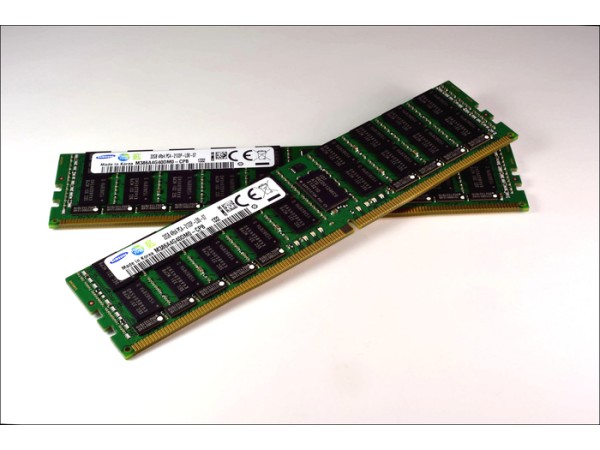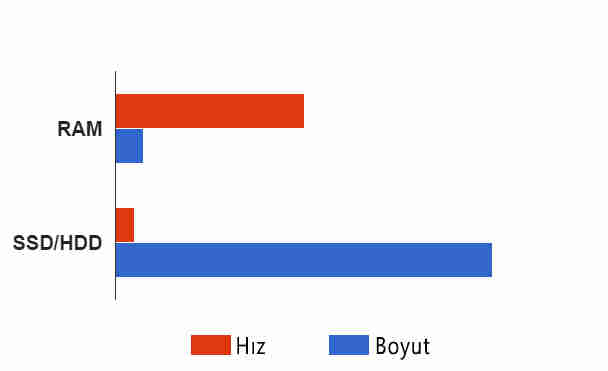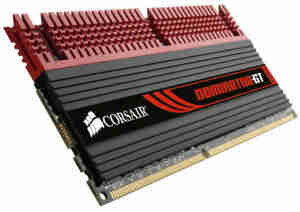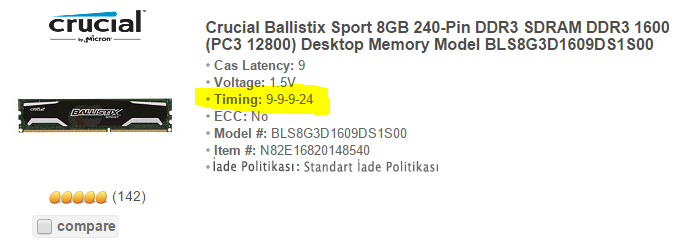

RAM (Rastgele Erişim Belleği için kısa) her bilgisayarın önemli bir parçasıdır, çünkü bilgisayarınızın şu anda kullandığı tüm verileri içerir. Bunu, bilgisayarınızın kısa süreli belleği olarak düşünürken, sabit sürücü uzun süreli bellek gibidir. Eğer iş yerindeyken bilgisayarınızı kullanırsanız o zaman bu en az ayrıcalık yöneticisi gibi bir şeye bakmak iyi bir fikir olabilir.
Bilgisayarınızın güvenli olduğundan emin olmak için yazılım.
RAM neden önemlidir? Ne kadar RAM'e ihtiyacınız var ve ne kadar hızlı olması gerekiyor? Bu soruları yanıtlayacağız ve umarız yol boyunca RAM ile ilgili bazı yaygın mitlerimiz var.
Bilgisayarınızın kısa süreli belleği olarak RAM, hızlı bir şekilde erişilebilen makul miktarda bilgi depolar. RAM, en hızlı SSD veya sabit sürücüden bile yüz kat daha hızlıdır, ancak yaklaşık yüz kat daha az veri barındırır ve güç kesildiğinde bu verileri kaybeder.
RAM'in katı hal sürücülerine (SSD'ler) ve sabit sürücülere karşı hızının ve depolama boyutunun çok basitleştirilmiş bir karşılaştırması:

RAM Türleri
Masaüstü RAM'in çeşitli görünümleri olabilir.
Bunlar mütevazı bir soğutucu ile oldukça standart çubuklar:

Bunlar benzer, ancak düşük bir profile sahipler, böylece CPU soğutucu fanınızın önüne geçemezler:

Bazı RAM çubukları, daha fazla edinilmiş bir tadı olan büyük soğutucularla gelir. Bu soğutucular, bir CPU’nun soğutucu fanının yoluna girme ihtimalinin yüksek olması için yeterince uzun.

Bunlar masaüstü RAM'in tüm örnekleridir, ancak dizüstü bilgisayarlar için daha küçük boyutlar ve sunucular için özel sürümler de vardır.
Masaüstü RAM için, daha eski DDR3 hala yaygın olarak kullanılmasına rağmen, en modern tip DDR4'tür. DDR4 ve DDR3 varsa, DDR2 ve DDR1'e ne olduğunu merak ediyor olabilirsiniz. Yeni sürümlerin yerini aldıklarını varsaymak doğru olur. DDR3 ve DDR4, masaüstü bellek türlerinin uzun bir geçmişinde en yeniler.
Neden RAM tipi değişiyor? Neden tek tiple yapışmıyorsunuz? Yeni RAM türlerini daha hızlı yapan şeyin bir kısmı, farklı şekillerde çalıştıkları için. Her birkaç yılda bir yeni anakart, CPU ve RAM gereksinimi, daha hızlı hızlardan ve daha düşük güç kullanımından yararlanmak için fiyat ödemesidir.
Aşağıda, 1990’a dayanan RAM hızları grafiği görülmektedir. 2016’dan itibaren, yedi farklı türde masaüstü RAM’in gelişimini gördük ve hız her yeni türüyle önemli ölçüde arttı:

Bütün rakamlar ne anlama geliyor?
RAM için alışveriş yaparken, performansı ile ilgili çeşitli rakamlar görürsünüz: Depolama boyutu (gigabayt cinsinden), hız, voltaj, zamanlamaları, vs. - ancak bunların hepsi ne anlama geliyor?
Depolama boyutu
Çoğu durumda, PC üreticileri, gerçekte olduğundan daha fazla gigabayt RAM'e ihtiyaç duyduklarını varsayıyorlar. Bu, bilgisayarlar kadar eski bir efsane, üreticilerin daha fazla RAM satmayı ve işleri kolay bir sayıya indirgemekten memnun.
Sahip olduğunuz RAM miktarı, bilgisayarınızın ne kadar hızlı bir şekilde erişebileceğini belirler. Bilgisayarınızda herhangi bir zamanda yapmanız gereken her şeyi yapmak için yeterli RAM'iniz olduğu sürece, daha fazla RAM'e sahip olmak genellikle sizin için hiçbir şey yapmaz. (Video düzenleme gibi bazı uygulamalar, ek RAM'den yararlanabilir.)
Bilgisayarınızı her açtığınızda, uygulamalar RAM'e veri yükler. Örneğin, web tarayıcınızda açtığınız her sekme kendi RAM'inizin küçük bir kısmını alır. Açtığınız her program ya da çalıştırdığınız arka plan çalışması da biraz RAM alır.
Bilgisayarda yaptığınız her şey toplamdan daha az RAM harcadığı sürece, sorun yok. RAM'iniz dolduysa, her şey önemli ölçüde yavaşlar. Bu nedenle, RAM'inizi gereksiz yere temizlemek ve performansı geri yüklemek için bilgisayarınızı yeniden başlatmanız gerekebilir.
Çoğu insan için 8 GB RAM, oyun bilgisayarları dahil olmak üzere, çalışmak için fazlasıyla yeterli. Google Chrome'da düzinelerce açık sekme bulundurmak, Twitch'e akan ve aynı anda ikinci bir monitörde oynatılan bir filme sahip olan en modern PC oyununu çalıştırmak için bolca var. Aslında 8 gigabayt doldurmak için epeyce çaba harcıyor ve orta sınıf bir PC için önerdiğimiz miktar bu.
Çoğu zaman 4 GB RAM yeterlidir ve birkaç kuruştan tasarruf etmenin bir yolunu arıyorsanız alt uç PC'ler için bunu öneririz.
Bazı PC tutkunları tutkuyla en az 16 GB RAM ihtiyacınız olduğu konusunda ısrar edecektir. Ancak aklınızda belirli bir kullanımınız varsa, sadece 16 konser ya da daha fazlasını almayı düşünmeniz yeterlidir. Büyük dosyalarda çalıştığınız video düzenleme veya diğer üretim çalışmaları 16 GB veya daha fazla fayda sağlayabilir, ancak ortalama kişi bu kadar çok şeye ihtiyaç duymaz.
Hız
RAM hızı saniyede megatransfer cinsinden ölçülür. DDR, “çift veri hızı” anlamına gelir. Çifte, saat başına iki transfer gerçekleşir. Böylece 800 Megahertz'de çalışan DDR3 RAM'in bir çubuğu DDR3-1600 olarak adlandırılıyor çünkü saat devir başına iki transfer çekebiliyor. DDR3-1600'ü 1600 megahertz olarak adlandırmak gerçekten 1600 megatranster olduğu için yaygın bir hatadır.
DDR3 RAM'in resmi hızları 800, 1066, 1333, 1600, 1866 ve 2133'dür. Yaklaşık 1600 veya daha yüksek bir hıza ulaştığınızda, performans çoğu görev için dikkate değer ölçüde iyileşmeyi durdurur. Bilgisayarınızla özellikle yoğun bant genişliği gerektiren bir şey yapmadığınızı varsayalım, muhtemelen DDR3 RAM için 1600'e yerleşmeniz güvenlidir.
DDR4 RAM şimdiye kadar 4266'ya kadar çıkan hızları getirdi, ancak bu en hızlı DDR3 RAM'in üzerindeki performansı iki katına çıkaracağınız anlamına gelmez. Anandtech'in yeni bir kıyaslaması, uygulamaya bağlı olarak 2133 ve 3200 hızlarındaki RAM arasındaki performans farkının yüzde sıfır ila yüzde 5 olduğunu gösterdi.
RAM hızlarına baktığınızda, DDR3 1600 (veya DDR4 2400) normal bilgisayar kullanımı ve oyun için çok hızlıdır ve daha hızlı RAM, fiyat artışının çoğuna değmez. Bilgisayarınızda daha yüksek RAM hızlarından yararlanabileceği kanıtlanmış bir şey yapacağınızı biliyorsanız, bunun için gidin. Günümüzde 8GB Ram standart olarak eğlence amaçlı oyun PC'lerinin yanı sıra Work PC'lerde (cksglobal.net'de görülenler gibi) standarttır. İhtiyacınız olandan daha fazla gigabayt RAM almak gibi, daha hızlı RAM almak hiçbir şeye zarar vermez.

Dayanılmaz detaylara girmeden, zamanlamalar RAM hızıyla ilişkilidir ve düşük sayılar daha hızlı RAM anlamına gelir. Çok fazla para harcamaya değecek kadar fark yaratmıyorlar, ancak daha yüksek veya daha düşük zamanlama sayıları arasında seçeneğiniz varsa, alt olanları seçin.
Voltaj
Voltaj, dizüstü bilgisayarlar ve telefonlar gibi daha küçük cihazlarda çok daha büyük bir faktör oynar, ancak masaüstü RAM'lerinde bile, RAM'inizin ne kadar ısı ürettiğini ve ne kadar enerji tükettiğini etkiler.
DDR3 RAM için standart voltaj 1,5 volttur, ancak bazı DDR3 çubukları daha verimli 1.35 veya biraz daha güç aç 1.65. Karşılaştırma yapmak gerekirse, DDR2 için standart voltaj 1.8 volt, DDR4 ise daha verimli 1.2 voltluk bir standart oluşturdu. Küçük cihazlarda, bu ekstra güç tasarrufu, cihazların daha yüksek çözünürlüklü ekranlara veya daha iyi pil ömrüne sahip olması için daha fazla güç olduğu anlamına gelir.
RAM Hakkında Sıkça Sorulan Sorular
Şimdi, RAM ile ilgili birkaç genel soruyu yanıtlayalım.
S: Birden fazla küçük RAM çubuğu veya daha büyük bir RAM belleği olması daha mı iyi? (yani, 8 GB'lık bir çubuktan iki adet 4 GB'lık çubuk daha mı?)
C: RAM'inizi birden fazla çubuğa yaymak, çift kanal modundan yararlanarak çok küçük bir performans artışı sağlayacaktır. Ortalama olarak, biriyle karşılaştırıldığında iki çubukla% 2-3 performans artışı göreceksiniz. Biri üzerinde iki çubuk almak için seçeneğiniz varsa, bunun için gidin, ancak sadece fiyat benzer ise.
S: Hızları veya RAM markalarını karıştırmak uygun mu?
A: Karıştırma RAM nadiren herhangi bir soruna neden olur. 1333 bir çubuk ve 1600'lük bir çubuk gibi farklı hızlarınız varsa, tüm RAM'ınız otomatik olarak daha düşük hızda çalışır - bu durumda, 1333.
Markaları karıştırmak için, tüm RAM'ler paylaşılan standartlara göre çalışır, bu yüzden farklı markalar en düşük ortak hızlarda ve zamanlamalarda çalışacak olsa da, farklı markalar birlikte çalışacaktır. İster Kingston, Corsair, G.Skill, isterse başka bir kişi tarafından RAM satın alıyor olun, gerçek RAM çipleri üç şirketten biri tarafından üretilir: Micron, SK Hynix veya Samsung.
Çalışmayan RAM'ın tek karışımı, bir DDR3 çubuğu ve bir adet DDR4 çubuğu veya masaüstü RAM'lı bir dizüstü bilgisayar RAM'i gibi tamamen farklı türler kullanmaya çalışmaktır.
S: RAM ne kadar ısıtır? RAM'i bulabildiğim en büyük, en tehlikeli soğutucuları almalı mıyım?
A: RAM soğutucuları esas olarak estetik içindir. RAM'inizi hızlandırmayı planlamadığınız sürece, RAM üzerindeki soğutucuları tamamen gereksizdir. Ucuz soğutucuların RAM'inizin biraz daha sıcak çalışmasına neden olması nadir değildir ve bu kötü bir şeydir.
S: Öyleyse, üreticiler neden RAM'e soğutucu koymaya devam ediyor ?!
C: Çünkü havalı görünüyorlar, bu yüzden onları almaya devam ediyoruz!
Bu kadar!
RAM ile ilgili daha fazla bilgi edinmek veya iyi bir RAM satın almak için güncel öneriler almak istiyorsanız, ana sayfamızdaki önerilerle ilgili bilgisayar donanım bilgilerimize göz atın. Ve herhangi bir sorunuz varsa, lütfen aşağıda yorum yapmaktan çekinmeyin.

Yorum Yazın